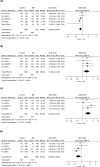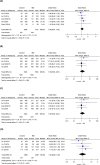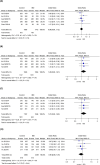Polymorphism of fucosyltransferase 3 gene is associated with inflammatory bowel disease: a systematic review
- PMID: 37719320
- PMCID: PMC10505062
- DOI: 10.2478/abm-2023-0044
Polymorphism of fucosyltransferase 3 gene is associated with inflammatory bowel disease: a systematic review
Abstract
Background: Inflammatory bowel disease (IBD) is a condition with an unclear genetic basis. Fucosyltransferase 3 (FUT3) could potentially be linked to IBD susceptibility.
Objective: To investigate the association between FUT3 gene polymorphisms and IBD.
Methods: Following the Preferred Reporting Items for Systematic Reviews and Meta-Analyses (PRISMA) 2020 checklist and Population, Intervention, Comparison, Outcomes, and Study (PICOS) guidelines, case-control studies published until April 30, 2020 was searched. Two independent reviewers conducted screening, data extraction, and quality assessment using the Newcastle-Ottawa Scale. Meta-analysis, sensitivity analysis, and Egger tests were performed using RevMan and Stata12.0.
Results: The review included 5 articles and 12 case-control studies involving 1712 IBD patients and 1903 controls. The meta-analysis revealed the following combined odds ratios [95% confidence intervals]: rs3745635 genotype (GA+AA vs GG) 0.84 (0.72-0.97), (GG+GA vs AA) 1.93 (1.23-3.05), (GG vs AA) 2.38 (1.52-3.74), (A vs G) 0.84 (0.73-0.96); rs3894326 genotype (TA+AA vs TT) 1.03 (0.87-1.23), (TT+TA vs AA) 1.19 (0.56-2.51), (TT vs AA) 1.19 (0.56-2.51), (A vs T) 1.02 (0.86-1.20); rs28362459 genotype (TG+GG vs TT) 0.98 (0.85-1.12), (TT+TG vs GG) 1.20 (0.90-1.61), (TT vs GG) 1.21 (0.90-1.62), (G vs T) 0.96 (0.86-1.07). Sensitivity analysis indicated the stability of the results, and Egger analysis showed no significant publication bias.
Conclusions: The rs3745635 gene polymorphism may be associated with IBD susceptibility, whereas the rs3894326 and rs28362459 gene polymorphisms may not be associated with IBD.
Keywords: fucosyltransferase 3 (FUT3); genotype; inflammatory bowel disease (IBD); meta-analysis; polymorphism.
© 2023 Jiansheng Zheng et al., published by Sciendo.
Figures




Similar articles
-
Correlation Of Fut2 And Fut3 Gene Polymorphisms With Inflammatory Bowel Disease In Guangxi Zhuang Population.Int J Gen Med. 2025 Mar 1;18:1217-1230. doi: 10.2147/IJGM.S505711. eCollection 2025. Int J Gen Med. 2025. PMID: 40046452 Free PMC article.
-
[Association of inflammatory bowel disease with the polymorphisms and haplotypes of fucosyltransferase 3 gene].Zhonghua Yi Xue Yi Chuan Xue Za Zhi. 2015 Dec;32(6):849-54. doi: 10.3760/cma.j.issn.1003-9406.2015.06.022. Zhonghua Yi Xue Yi Chuan Xue Za Zhi. 2015. PMID: 26663064 Chinese.
-
Association of Ulcerative Colitis with FUT2 and FUT3 Polymorphisms in Patients from Southeast China.PLoS One. 2016 Jan 14;11(1):e0146557. doi: 10.1371/journal.pone.0146557. eCollection 2016. PLoS One. 2016. PMID: 26766790 Free PMC article.
-
Association between X-ray repair cross-complementing group 1 gene polymorphisms and glioma risk: a systematic review and meta-analysis based on 22 case-control studies.Int J Clin Exp Med. 2015 Aug 15;8(8):11863-80. eCollection 2015. Int J Clin Exp Med. 2015. PMID: 26550099 Free PMC article. Review.
-
ERCC2 rs13181 Polymorphism Association with Glioma Risk: an Update Meta-Analysis.Indian J Surg Oncol. 2023 Mar;14(1):60-68. doi: 10.1007/s13193-022-01623-6. Epub 2022 Aug 18. Indian J Surg Oncol. 2023. PMID: 36891435 Free PMC article. Review.
Cited by
-
Correlation Of Fut2 And Fut3 Gene Polymorphisms With Inflammatory Bowel Disease In Guangxi Zhuang Population.Int J Gen Med. 2025 Mar 1;18:1217-1230. doi: 10.2147/IJGM.S505711. eCollection 2025. Int J Gen Med. 2025. PMID: 40046452 Free PMC article.
-
Regulation of the Lewis Blood Group Antigen Expression: A Literature Review Supplemented with Computational Analysis.Transfus Med Hemother. 2024 Jun 19;51(4):225-236. doi: 10.1159/000538863. eCollection 2024 Aug. Transfus Med Hemother. 2024. PMID: 39135855 Free PMC article. Review.
References
-
- Sairenji T, Collins KL, Evans DV. An update on inflammatory bowel disease. Prim Care. 2017;44:673–92. - PubMed
-
- Qian JM, Yang H. From consensus guideline to clinical practice of inflammatory bowel disease. Chin J Dig (Chinese) 2018;38:289–91.
-
- Koliani-Pace JL, Siegel CA. Prognosticating the course of inflammatory bowel disease. Gastrointest Endosc Clin N Am. 2019;29:395–404. - PubMed
-
- Xie LK, Wang ZR. Research progress of glycosyltransferase and inflammatory bowel disease. Chin J Digest Med Imageol (Electronic Edition) (Chinese) 2017;7:36–40.
-
- Shen H, Tang ZP, Tang XD, Zhang L, Liu YJ, Ye B. et al. Traditional Chinese medical diagnosis and treatment guide for ulcerative colitis, a common disease of digestive system. CJTCMP (Chinese) 2019;34:4155–60.
Publication types
LinkOut - more resources
Full Text Sources
Miscellaneous
